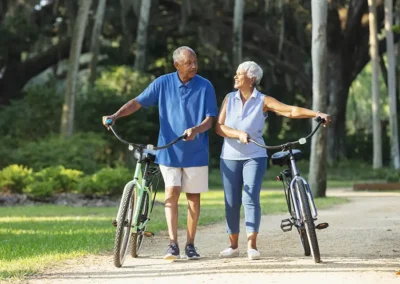The Importance of Short-Term Memory and Aging
Short-term memory plays a crucial role in daily life, helping us retain and process information in the moment—from remembering a phone number long enough to dial it to recalling directions to a new location. This type of memory is part of working memory, which allows us to temporarily hold and manipulate information. Other types of memory include long-term memory, which stores information over extended periods, and procedural memory, which helps us remember how to perform tasks.
Maintaining cognitive function becomes increasingly important as we age, especially for seniors looking to stay independent and active. Research suggests that mild changes, such as occasional forgetfulness, memory loss, or slower information recall, are a normal part of aging. These changes can also happen because of certain medical conditions like mild cognitive impairment (MCI), stress, or medication side effect.
However, regular mental stimulation and memory exercises can help slow cognitive decline, support short-term memory, and improve memory function.
At Amavida, we focus on cognitive health. It is a key part of overall wellness for seniors in our Fort Myers rental community. Here are some helpful short-term memory exercises for seniors to incorporate into your daily activities to enhance brain function and keep your mind sharp.
Understanding Short-Term Memory
Short-term memory is the ability to hold and use information briefly, typically 15-30 seconds without rehearsal. It differs from long-term memory, which retains information for a long time. It also differs from working memory, which helps with problem-solving.
This cognitive function is the gateway to forming new long-term memories and helps us easily navigate daily tasks. When short-term memory functions well, seniors can:
- Follow conversations with ease
- Remember medication schedules
- Recall where they placed everyday items like keys or glasses
- Follow recipes and instructions
- Navigate familiar and new environments confidently
Effective Strategies To Strengthen Short-Term Memory
1. Play Short-Term Memory Games
Memory games challenge the brain, improve recall, and enhance cognitive flexibility. Try incorporating these engaging activities into your daily routine:
- Matching pairs: Traditional card games like Concentration where you flip cards to find matching pairs
- Word recall exercises: Read a short list of words, then cover it and write down as many as you can remember
- Number sequences: Start with remembering a sequence of 3-4 numbers, then gradually increase the length
- Digital brain training apps: Programs like Lumosity, CogniFit, or BrainHQ offer specialized memory games designed by neuroscientists
- Try this today: Remember all the items in your refrigerator or pantry during commercial breaks while watching TV. Check your accuracy afterward—you might be surprised at what you remember and what you forget!
2. Engage in Mental Exercises
Keeping the mind active helps preserve cognitive function by creating new neural connections. Activities that require focus and problem-solving include:
- Crossword puzzles and Sudoku: These classics combine pattern recognition with vocabulary and numerical reasoning
- Brain teasers and logic puzzles: Riddles and lateral thinking puzzles engage different parts of the brain
- Learning new skills: Taking up painting, digital photography, or pottery creates novel neural pathways
- Musical engagement: Learning an instrument or even just listening actively to complex music stimulates multiple brain regions
- Real-life application: To combine cognitive exercise with social interaction, participate in many of Amavida’s activities, from book club and bridge club to games and trivia.
3. Practice Repetition and Association Techniques
Reinforcing information through repetition and associations strengthens memory pathways. These techniques are particularly effective for everyday tasks:
- Repeating new information aloud: Say someone’s name multiple times when first meeting them
- Using visualization techniques: Create a mental picture of where you placed important items
- Creating mnemonic devices: Acronyms, rhymes or stories can help remember lists or sequences
- Chunking information: Group phone numbers or passwords into smaller, manageable units
- Associating new concepts with familiar ones: Connect new acquaintances with celebrities they resemble
- Memory-boosting tip: When learning someone’s name, create a visual story connecting their name to a distinctive feature. For example, if you meet Barbara who has curly hair, imagine a barber cutting curly hair.
4. Stay Physically Active
Physical activity supports brain health by improving blood circulation, reducing inflammation, and stimulating growth factors that protect neurons. Even gentle movement makes a difference:
- Walking or light jogging: Aim for 30 minutes of walking daily around Amavida’s scenic grounds or adjacent Lakes Park
- Yoga or tai chi: These mind-body practices improve balance while reducing stress
- Water aerobics: Low-impact exercise that’s joint-friendly and social
- Chair exercises: Accessible movements that can be done by anyone regardless of mobility
- Dance classes: Combining physical movement with memory for steps and coordination
- Community opportunity: Join Amavida’s Nature Walk group that combines gentle exercise with stimulating conversation—perfect for body and mind!
5. Prioritize Quality Sleep
Sleep is essential for consolidating short-term memories into long-term storage. During deep sleep, the brain processes and organizes information from the day. Seniors can improve sleep quality by:
- Maintaining a consistent sleep schedule: Go to bed and wake up at the same time daily
- Creating a relaxing bedtime routine: Reading, gentle stretching, or meditation before sleep
- Limiting screen time before bed: The blue light from devices interferes with melatonin production
- Optimizing bedroom environment: Keep the room cool, dark and quiet
- Avoiding caffeine and alcohol close to bedtime: These substances disrupt sleep quality
- Sleep hygiene tip: If you can’t fall asleep within 20 minutes, leave your bedroom and do something relaxing until you feel drowsy, then return to bed.
6. Practice Meditation and Mindfulness
Reducing stress and improving focus through mindfulness practices can boost memory recall and cognitive function. Regular practice helps calm the mind and improve concentration:
- Deep breathing exercises: Simple 4-7-8 breathing (inhale for 4, hold for 7, exhale for 8)
- Guided meditation sessions: Use apps like Calm or Headspace
- Nature-based mindfulness: Spending time in our community gardens or in Lakes Park with attention to sensory details
- Mindful eating: Focusing completely on the flavors, textures and aromas of each meal
- Body scan practices: Progressively relaxing each body part from toes to head
- Quick mindfulness exercise: Take three minutes daily to sit quietly and focus solely on your breathing. When thoughts arise, gently redirect attention back to your breath.
7. Embrace a Brain-Healthy Diet
Nutrition plays a key role in brain health, with certain foods providing essential nutrients for cognitive function. A Mediterranean-style diet, rich in the following foods, supports memory and overall brain health:
- Colorful vegetables and fruits: Especially leafy greens, berries, and red/purple produce rich in antioxidants
- Omega-3 fatty acids: Found in fatty fish like salmon, sardines and mackerel
- Healthy fats: Avocados, olive oil, and nuts provide essential fatty acids
- Whole grains: Oats, brown rice, and quinoa for sustained energy
- Lean proteins: Chicken, beans, and legumes support neurotransmitter production
- Adequate hydration: Dehydration can significantly impair memory and attention
- Nutrition insight: At Amavida’s dining venues, look for menu options featuring these memory-supporting foods in delicious combinations.
8. Maintain Social Connections
Social engagement provides cognitive stimulation and emotional support that directly benefit memory function:
- Group discussions: Participating in book clubs or current events forums
- Team games: Playing bridge, mahjong, or other strategy games with friends
- Volunteering: Teaching or mentoring others reinforces your knowledge
- Intergenerational activities: Interacting with younger family members or community members
- Digital connections: Video calls with distant loved ones exercise technology skills while maintaining relationships
- Social opportunity: Take part in Amavida’s rich social life.
Specialized Memory Care at Amavida
For seniors experiencing more significant memory challenges caused by Alzheimer’s disease or another form of dementia, Amavida’s dedicated Memory Care program provides comprehensive support:
- Personalized cognitive therapy: Individual programs tailored to each resident’s abilities and interests
- Structured daily routines: Consistent schedules that reduce anxiety and support memory function
- Specialized memory-enhancing activities: Art therapy, music reminiscence, and sensory stimulation
- Secure, thoughtfully designed environments: Spaces that promote independence while ensuring safety
- Trained Memory Care specialists: Staff educated in the latest cognitive support techniques
- Family education and support: Resources to help loved ones understand memory changes and learn effective communication strategies
Take the Next Step Toward Better Cognitive Health
Keeping your mind sharp is essential for maintaining independence and quality of life. At Amavida, our Memory Care program provides engaging activities, expert support, and a vibrant community designed to enhance cognitive ability and well-being.
Whether you’re looking for ways to improve memory or need specialized care for a loved one, we’re here to help.
Contact us today to learn more about our Memory Care services and schedule a community tour.


